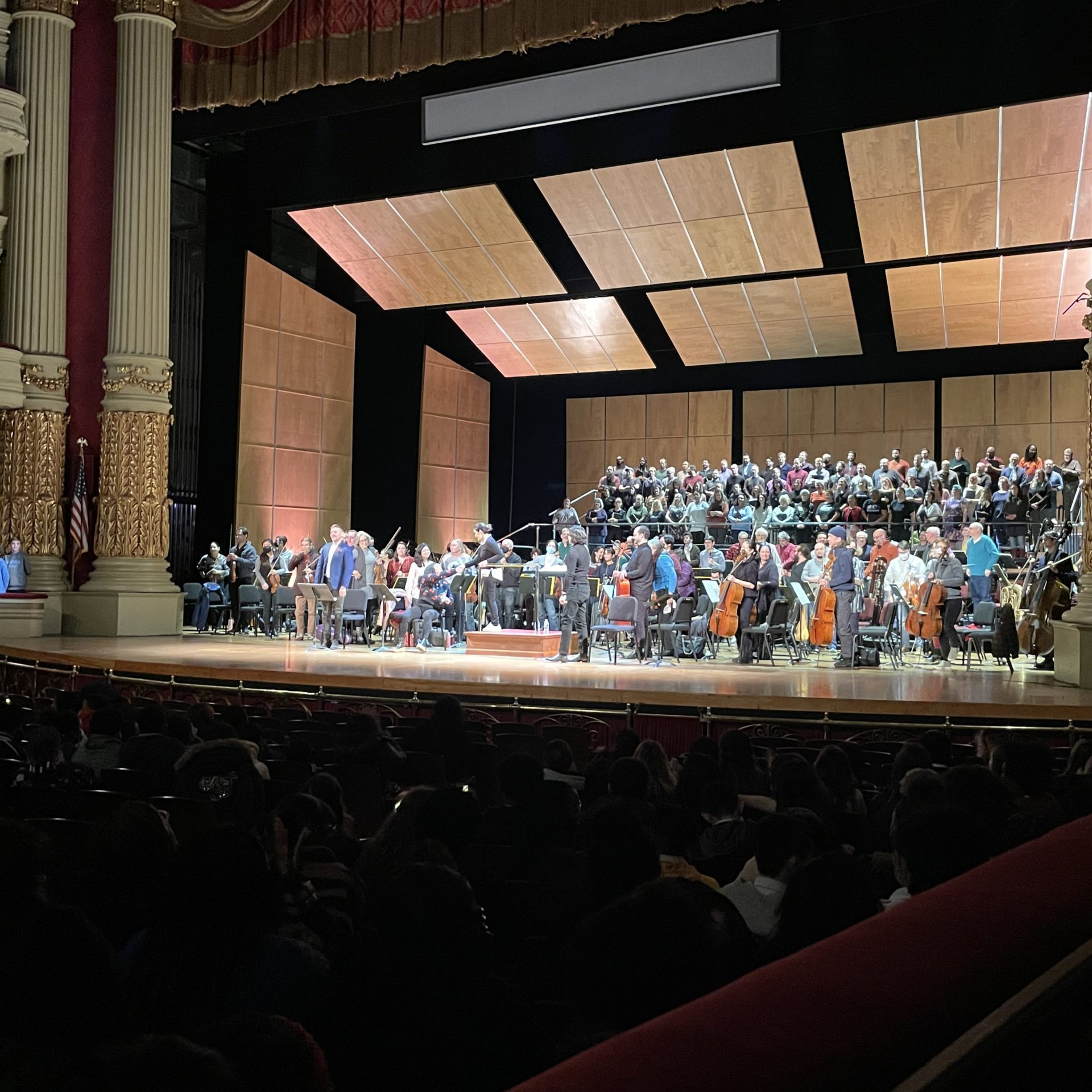It feels appropriate to disclose my bias and profound love for Margaret Bonds’ Credo early in this review. It has become one of my most loved pieces of music from the 20th Century, partly because of its powerful sentiment and the sheer beauty and partly because of my personal connections to it. Dr. Rollo Dilworth, a Trustee for The Presser Foundation and my professor at Temple University, wrote his dissertation on this incredible work at Northwestern University. His work on Credo brought me to the piece, and I recently recorded the final three movements (V, VI, and VII) as part of my Presser Foundation Graduate Music Award. To say this piece means a lot to me would be an understatement.
With that disclosure in mind, it is no surprise that I leapt at the opportunity to see one of the few performances of Bonds’ Credo with a full orchestra and chorus. Opera Philadelphia recently mounted this significant effort and paired Credo with Carl Orff’s Carmina Burana. If you’re unfamiliar with the title, you would undoubtedly be familiar with the universally recognized O Fortuna. While Carmina Burana was spectacularly performed and a creative pairing, in an effort to continue highlighting and prioritizing lesser-known works, this post will focus solely on Credo.
I recorded the piano and chorus setting of Bonds’ Credo, so to hear this piece fully orchestrated was an exciting opportunity. First, though, a bit about the music.
Credo is a stunning piece of music that showcases the composer’s mastery of blending Western classical and spiritual traditions in an organic and original way. As a classically trained pianist and composer, Bonds drew on her experiences and personal musical history to create a piece that celebrates the intersections of faith, culture, and history.
The text for Credo is taken from W.E.B. Du Bois’s 1904 essay of the same title. His powerful and thought-provoking essay lays out Du Bois’ beliefs about the nature of humanity and the role of the individual in society. Through the lens of race, Du Bois argues that all humans have an innate dignity and worth and that this dignity should be celebrated by society. His writing is eloquent and passionate, conveying a sense of urgency and conviction that inspires and challenges readers. He argues that the pursuit of knowledge and understanding is essential to the human experience and that individuals are responsible for using their gifts and talents to make the world a better place. Despite being written over a century ago, Du Bois’ Credo is still relevant and resonant today. I think one section most aptly summarizes the sentiment of his writing:
I Believe in Liberty for all men: the space to stretch their arms and their souls, the right to breathe and the right to vote, the freedom to choose their friends, enjoy the sunshine, and ride the railroads, uncursed by color; thinking, dreaming, working as they will in the kingdom of beauty and love.
Returning to Bonds’ setting of this text, her use of harmony and counterpoint throughout is particularly noteworthy. She weaves complex musical themes together, using subtle rhythmic and melodic shifts to create complex, layered, and engaging soundscapes. The effect is mesmerizing, drawing listeners into the music and conveying the spiritual depth of Bonds’ writing.
The mighty and focused sound produced by the Opera Philadelphia Chorus and Orchestra was well-suited to this work. They certainly left no stone unturned. Lina González-Granados’ conducting was efficient, effective, and beautiful – what more can one ask? Soprano soloist Brandie Sutton was by far the highlight of the performance – for myself and the house full of Philadelphia school-aged children.
Opera Philadelphia deserves high praise for the structure and resources created to facilitate an invited dress rehearsal that filled the Academy of Music with what I assume were predominantly middle-school aged students. The program guide they produced broke down these two significant works into digestible bits of information for students.
 Credo is a particularly apt work to present in this format for Philadelphia students who, as of the 2022-2023 school year, are 44.5% Black/African-American. Inviting students to a performance that directly challenges racial conflict and uplifts the Black lived experience creates an unparalleled opportunity for these students to feel welcome in the classical space. A frequent anecdote in education (a quote from American author John Maxwell) is that students won’t care about how much you know until they know how much you care. This directly translates to their engagement with Classical music – if we don’t find ways to reflect their experiences in the concerts they attend, why would we expect them to care about these concerts?
Credo is a particularly apt work to present in this format for Philadelphia students who, as of the 2022-2023 school year, are 44.5% Black/African-American. Inviting students to a performance that directly challenges racial conflict and uplifts the Black lived experience creates an unparalleled opportunity for these students to feel welcome in the classical space. A frequent anecdote in education (a quote from American author John Maxwell) is that students won’t care about how much you know until they know how much you care. This directly translates to their engagement with Classical music – if we don’t find ways to reflect their experiences in the concerts they attend, why would we expect them to care about these concerts?
These students brought a unique energy and engagement level that might challenge some traditionalists in classical concert halls. (My views on the highly problematic nature of concert etiquette are better suited for another post). Their energy was infectious throughout, and this type of programming and educational outreach is crucial to the longevity of organizations like Opera Philadelphia in our communities. Many organizations would benefit from looking to Opera Philadelphia as a role model in this regard.








